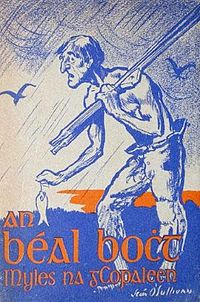Mistéir an Fhrása ‘ó chorchtacht’ [sic] in ‘An Béal Bocht’ — Réitithe (An Irish typo — solved) Posted by róislín on Apr 20, 2015 in Irish Language
(le Róislín)

An Béal Bocht, an chéad eagrán, foilsithe i 1941 (http://en.wikipedia.org/wiki/File:AnBealBocht.jpg)
When I first read the delightful Irish satirical classic, An Béal Bocht, (The Poor Mouth), one phrase that puzzled me was “… i bpriacal do mharfa ó chorchtacht na tíre” (p. 14). Literally, it would mean, “… in danger of being killed from the “corchtacht” [sic] of the land.” The official translation gives “from the steep gradient” for “ó chorchtacht.” But I was never able to find the basic word “corchtacht,” as such, in any dictionary.
The closest word was “crochtacht” (steepness), which would certainly make sense. But I always wondered why we had “ó chorchtacht” in both recent editions of the Irish language text (Mercier, 1986 and Mercier 1999). I pondered the possibilities. Was this a dialect spelling? Or a different word? Or some kind of word play on “Corca Dorcha,” the fictitious Gaeltacht setting of An Béal Bocht? But “Corca Dorcha” has the “ch” in “Dorcha,” not in “Corca,” so why would there be a word like ” *corch” as the root of “corchtacht,” even for imeartas focal (word play)?
Or was it just a typo (botún cló)?
So I finally got to see one of the earliest editions of the work, the version printed by “An Press Náisiúnta” in 1942, printed in the seanchló (old print). DAS, yes, it’s “press” not “preas.” And, lo and behold (or could I say, “cló and behold”), there was my long-awaited word in its original spelling. As I had suspected, it was “crochtacht,” so the phrase read, in the original spelling, as “i bpeiriceal do mharbhtha ó chrochtacht na tíre” (lch. 14). It appears that the author had the usual spelling, but that the letters got reversed in the more recent editions.
Well, maybe that was all much ado about nothing much, just a typo. I hope you don’t think I’ve made a mountain (however steep the gradient) out of a molehill (hmm, the steepness gradient of a molehill?). But the question did plague me for over 20 years, and I was glad to finally be able to check the earlier printing.
Of course, there is much more to absorb about An Béal Bocht than the issue of a single typo. Who wrote this wit-laden and wonderfully cliché-cluttered faux autobiography? The author was Brian Ó Nualláin (Brian O’Nolan, 1911-1966), who had two main pen names, no less! The first was “Myles na gCopaleen”(an Irish name in anglicized spelling). The second was “Flann O’Brien,” the name under which he wrote some of his other classic works, such as At Swim Two-Birds and The Hard Life. At Swim Two-Birds, was recently rumored to have been optioned for a movie, but last I looked online, there was nothing very definitive about it. Tá mé ag fanacht fós! BTW, O’Nolan also had a couple other “ainmneacha cleite,” which don’t seem to be as well known, like “George Knowall” (leagan de “Ó Knowalláin,” is dócha).
And by the wayX2, where else do we know this author from, a bit more on the side of popchultúr? ABC’s TV program Lost included some references to yet another Flann O’Brien novel, The Third Policeman, and apparently sales of the book spiked around that time. Lost‘s use of The Third Policeman is doubly interesting because O’Brien (i.e. O’Nolan) couldn’t find a publisher for the original manuscript, more or less gave up on it, and when the topic came up, he claimed he had, errmm, lost it. It wasn’t lost, just sitting, waiting for another attempt. It was published posthumously. GRMMA, a Lost, as an tagairt agus a “MacGibbon & Kee” as é a fhoilsiú i 1967! One wonders, how much research did the Abrams-Lieber-Lindelof team do in planning to use The Third Policeman in their Lost. Food for thought!
Before finishing up this post, let’s look at a few of the Irish or anglicized Irish words used above:
Copaleen, in the ainm cleite, Myles na gCopaleen: little horse, from “capaillín” (pony), which in turn is from “capall” (horse), a nice cognate of “cheval” (Fraincis), “caballo” (Spáinnis), and “caballus” (Laidin), among others.
In the pen name, instead of “Copaleen,” we see “na gCopaleen,” which makes the word plural and genitive, meaning “of the ponies” or “of the little horses.” I’ve always wondered why it’s not closer to “na gCapaillíní,” since we’d normally have the “-í” ending in Irish. But maybe ending the word at “-een” just sounded better. Eolas ag duine ar bith?
priacal, peril; i bpriacal [ib-RzhEE-uh-kul, the “p” becomes silent], in peril
do mharfa [duh WAHR-uh-fuh], your killing, i.e. the killing of you, from “marú” (to kill, killing)
na tíre [nuh TEERzh-uh], of the land, from “tír” [teerzh], land
And regarding the pronunciation of the author’s original name, just remember that, in Irish, “Brian” sounds like “BRzhEE-un”, not like “BRY-un” (with the “bry” like English “my” or “cry”). The “zh” in my transcription stands for the buzzy “slender” Irish “r” sound that we also hear in “Máire” [MOYRzh-uh] and “tirim” [TIRzh-im].
“Ó Nualláin” is the Irish original of the surname “Nolan” and is pronounced “OH NOO-uh-law-in.”
Well, there’s much much more one could say about O’Brien / na gCopaleen / Ó Nualláin, but I hope that this little linguistic detail will prove helpful to other readers of An Béal Bocht, since I imagine others have been puzzled by the corchtacht/crochtacht dilemma as well. SGF — Róislín

Build vocabulary, practice pronunciation, and more with Transparent Language Online. Available anytime, anywhere, on any device.




Leave a comment: